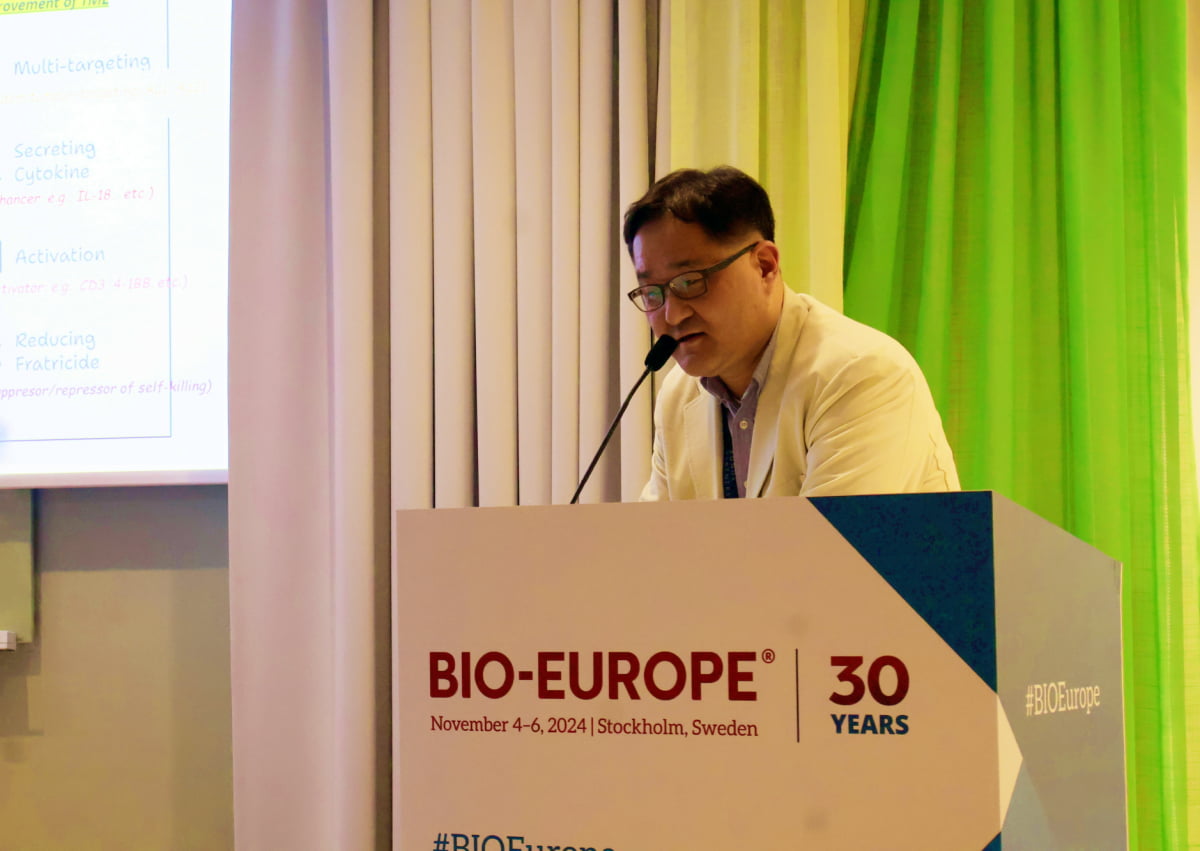Lee Jong-soo, head of Utilex’s business development division, is presenting about the company’s CAR-T technology at Bio Europe 2024 held in Stockholm, Sweden. Provided by Utilex
Eutilexunveiled its next-generation CAR-T (chimeric antigen receptor T cell) platform at a large bio event held in Europe.
Eutilex announced on the 6th that it announced its CAR-T platform at ‘Bio Europe 2024’ held in Stockholm, Sweden on the 4th.
The CAR-T platform unveiled by Eutilex is based on 4th generation Armored CAR-T technology and includes element technologies that can overcome the cancer-specific tumor microenvironment (TME) that occurs in solid cancers, which have higher entry barriers than blood cancers. did it The 4th generation Armored CAR-T is a CAR-T implemented with engineered element technologies such as Enhancer, Engager, and Multi-targeting to enable T cells to powerfully attack cancer cells. Enhancer, a representative element technology, further strengthens the immune response and the production, secretion, and activity of immune activation cytokines in the tumor microenvironment, ultimately increasing the treatment effect of solid cancer.
Unlike blood cancer, solid cancer is in the form of a lump, making it difficult for treatments to reach tumor cells, and its solid physical structure makes it difficult for treatments to penetrate. In addition, compared to blood cancer, solid cancer has the characteristic that the tumor continues to grow due to high interaction between cancer cells. Due to these characteristics, there is no treatment that significantly extends the patient’s survival period, so the 5-year relative survival rate for distant metastatic liver cancer is only 3.1%, and the overall survival rate including primary cancer is around 39.3%. On the other hand, the 5-year relative survival rate for patients with non-Hodgkin lymphoma, a blood cancer, is 65.4%.
When looking at the treatment market, about 15,000 patients develop liver cancer every year in Korea, which is three times the number compared to non-Hodgkin lymphoma, a blood cancer. All CAR-T treatments approved to date are blood cancer treatments, and there are no CAR-T treatments approved for solid cancer.
Eutilex, which encompasses the entire process of research and development, clinical trials, and manufacturing of therapeutics, is organically linking clinical sample analysis and non-clinical testing to not only develop its own CAR-T but also collaborate through the CAR-T platform. A company official said, “Companies that have anti-cancer targets but do not have CAR-T research and development and manufacturing capabilities can reduce the speed and cost of treatment development through Eutilex’s CAR-T platform.”
Lee Jong-soo, head of Eutilex’s business development division, said, “The era of solid cancer treatment in CAR-T will begin in earnest,” and “It will become an important axis of Eutilex’s business development.”
Reporter Lee Woo-sang [email protected]


